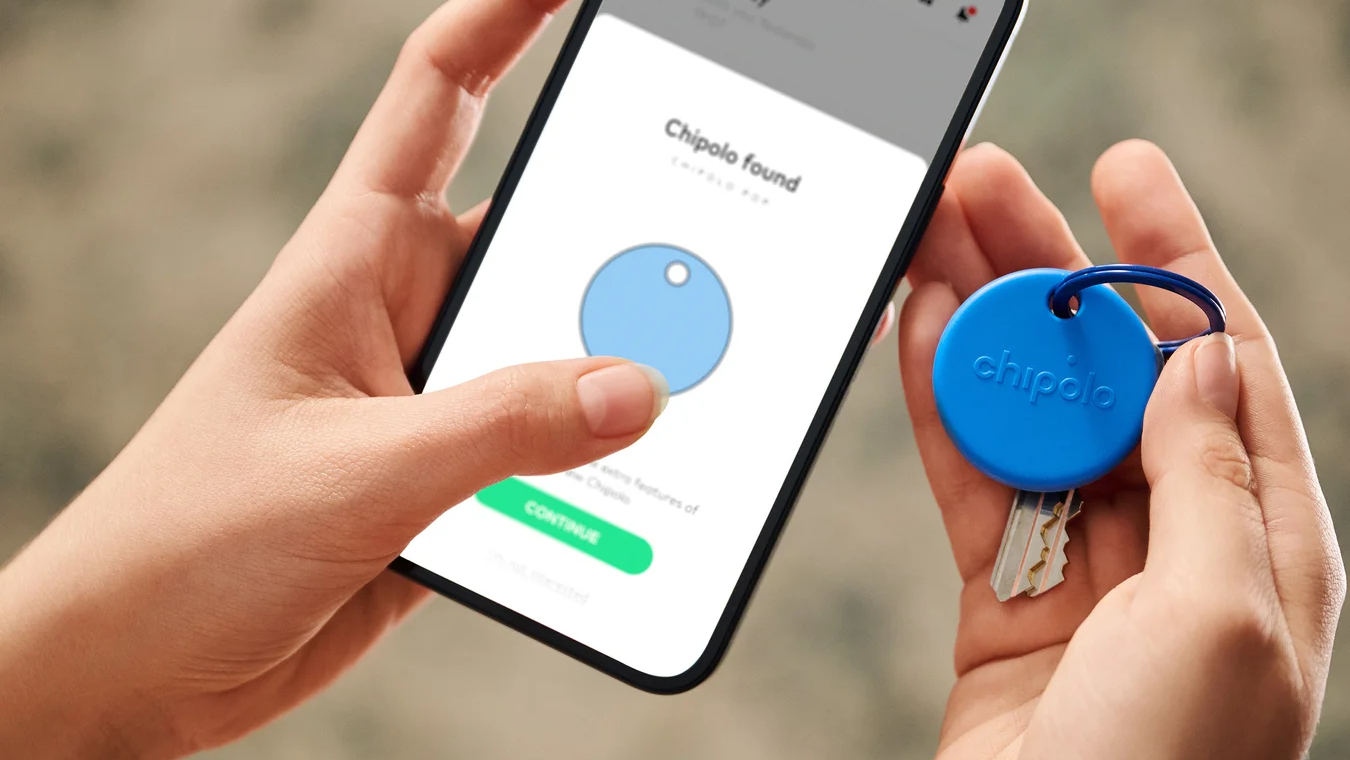The iPhone 6s Is The World’s Fastest Smartphone
The brand new iPhone 6s unseats the Galaxy S6 to become the fastest smartphone in the world.
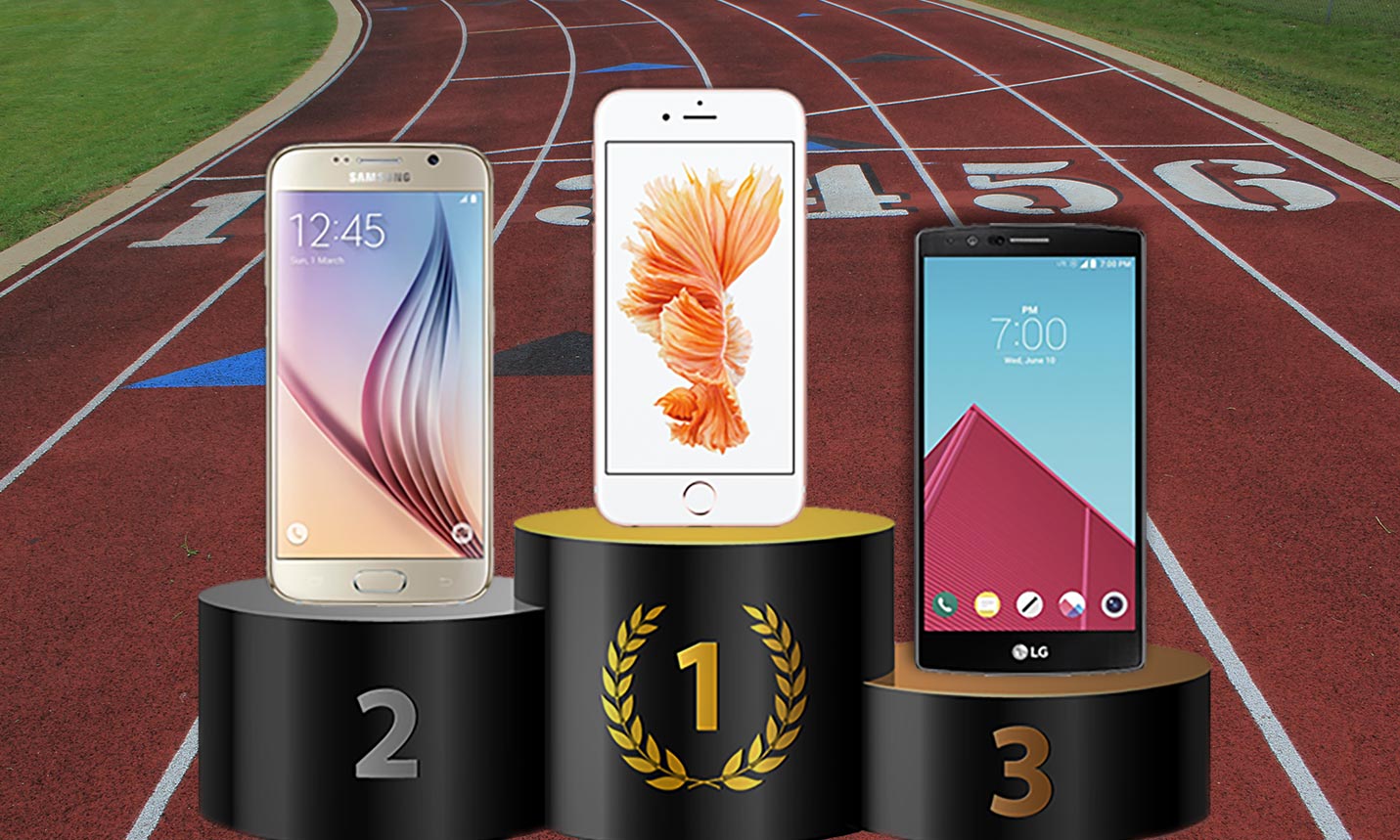
A fast phone shouldn't just score well in benchmarks. It should deliver swift, everyday performance, too, whether it's opening a large file, gaming without lag or firing up its camera faster than you can say "cheese." We pitted six of the latest smartphones against each other in eight rounds of competition, and the Apple iPhone 6s came out on top, finishing first in six out of eight real-world tests and synthetic benchmarks.
The Samsung Galaxy S6, our previous winner, is our runner-up, turning in the fastest camera-open time and consistently placing second. The LG G4 dropped to third place. The biggest letdown continues to be the now very dated Nexus 6, which finished sixth overall and dead last in opening our PDF, camera-open and gaming tests. But a new Nexus 6P is on the way and we will update this comparison when it arrives.
The Phones
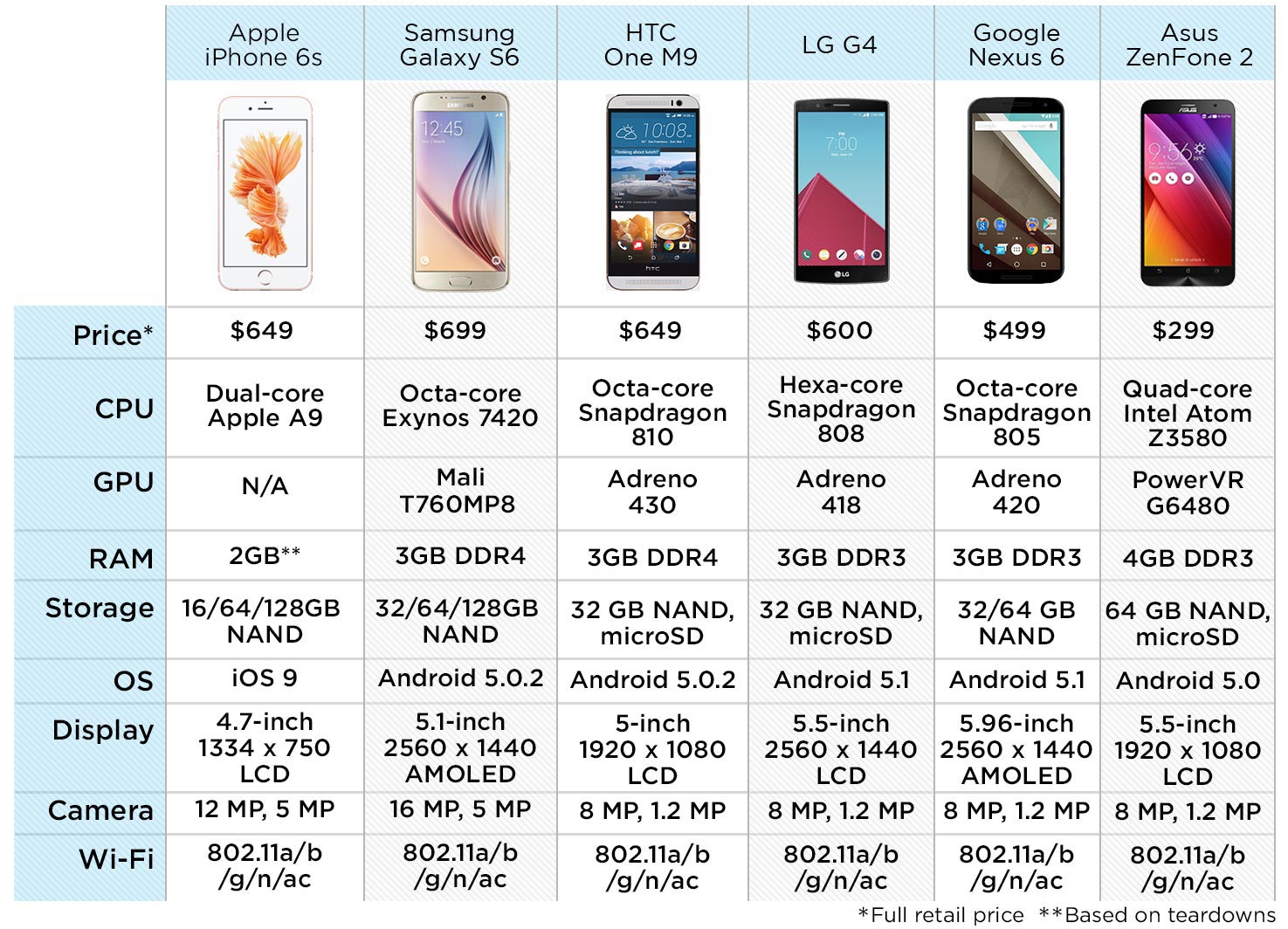
iPhone 6s: Apple promised the A9 processor in the new iPhone would be significantly faster than it’s predecessor, with up to 70 percent faster CPU performance and 90 percent graphics, which means faster gameplay. And fast it is.
MORE: iPhone 6s Review
Samsung Galaxy S6: Samsung developed its own octa-core Exynos 7420 processor instead of opting for one of Qualcomm's CPUs. The S6 is also one of just two phones in this contest featuring advanced DDR4 memory (the other being the HTC One M9), and it features a faster storage format called UFS 2.0, which promises SSD-like speeds in a phone.
MORE: Samsung Galaxy S6
LG G4: With its Snapdragon 808 CPU, the G4 has difficulty matching the raw power of the S6, but it was the fastest to open its camera and snap a picture, and the second-fastest phone on our video-editing test and the Geekbench 3 performance benchmark.
MORE: LG G4 Review
HTC One M9: The HTC One M9 features Qualcomm's most powerful processor, the Snapdragon 810, and in theory should be able to keep up with the S6. Unfortunately, with the exception of graphics tests, the One M9 disappointed with weak performance.
MORE: HTC One M9 Review
Asus Zenfone 2: The Zenfone 2 is an interesting beast, featuring an Intel Atom Z3580 CPU and unmatched 4GB of RAM for an affordable $299. This phone finished a fairly strong third in our memory benchmark but didn't place better than that in any other test.
MORE: Asus Zenfone 2 Review
Google Nexus 6: As the ambassador for stock Android, the Nexus 6 should demonstrate the height of Google's smartphone experience, and while even its slightly older Snapdragon 805 SoC performed admirably, real-world results were disappointing, due to lethargic camera speeds, average Wi-Fi throughput and poor game performance.
Real-Word Performance Tests
PDF Load Time
To start, we wanted to see how long it would take each phone to open a whopper of a PDF (1.6GB). We measured the time it took to open the PDF (using Adobe Reader on Android and iOS) with a camera capable of recording slow-motion video at 240 fps. The iPhone 6s solidly beat the rest of the competition--and opened the PDF in just 82 milliseconds. Our previous fastest phone, the Galaxy 6, accomplished the same task in a now sluggish-looking 127 ms.
The Nexus 6, the only competitor running stock Lollipop, lagged far behind handsets running skinned versions of Google's OS with a laborious open time of 482 ms--that’s six times slower than the 6s.
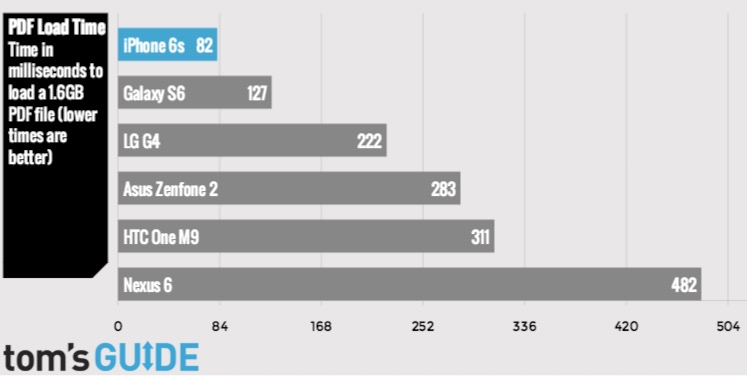
Camera Load Time
Because you never know when you need to snap a photo, we wanted to test how long it takes to open the camera with 10 apps running in the background, including such popular programs as Facebook, Instagram and Twitter.
The top three phones separated themselves from the pack, with the LG G4 leading the way with a time of just 52.5 ms. The Galaxy S6 was close behind with 55.5 ms. The 6s landed in third place with 67.2 ms. These speeds were all in stark contrast to the Nexus 6, which sat in dead-last place with 128 ms — more than twice as slow as the G4, S6 and iPhone 6s.
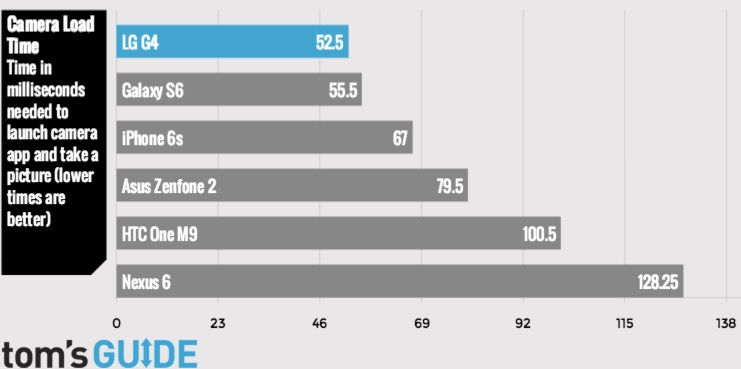
Gaming Performance
Traditional graphics benchmarks don't necessarily provide a good measuring stick for gaming performance — they can be "gamed" by savvy phone manufacturers and often lack real-world context. That's why we used GameBench's new desktop tool to measure the average frame rate over a 3-minute racing session in the graphics-intensive Asphalt 8 game.
The iPhone 6s just barely squeaked past the Samsung Galaxy S6 by managing 31 frames per second to the S6’s 30 frames per second. The poor Google Nexus 6 came in well behind the rest of the pack, managing a tolerable 26 fps.
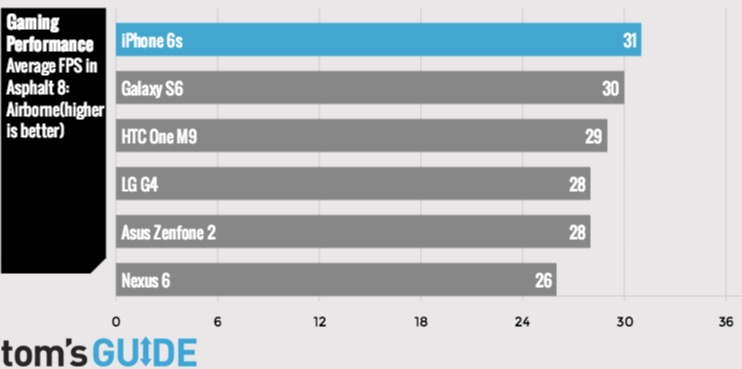
Benchmark Results
Geekbench 3
First up is Geekbench 3, which evaluates the CPU, RAM, GPU and storage, and combines them into a single score representing overall system performance. With a mark of 5,283, the Samsung Galaxy S6's octa-core Exynos 7420 SoC and speedy 3GB of DDR4 RAM crushed the competition. That's 20 percent faster than the second-place iPhone 6s, and 50 percent faster than the third-place LG G4.
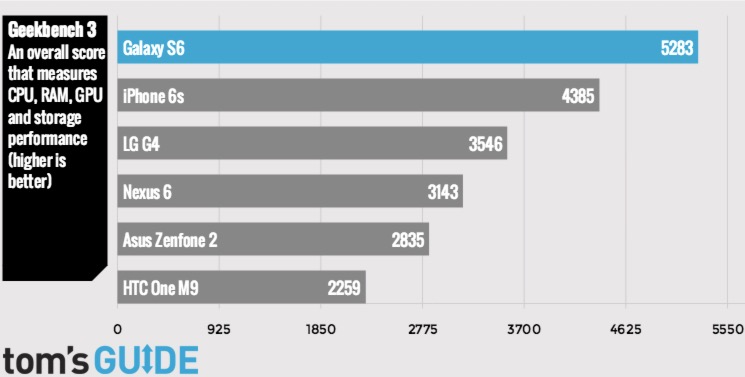
MORE: Best Smartphones on the Market Now
Basemark OS II System
In Basemark OS II's system test, which performs multiple floating-point and integer calculations, among other computations, the 6s retained its lead. Interestingly, the Asus Zenfone 2 finished ahead of the HTC One M9 in the system test despite costing less than half the price.
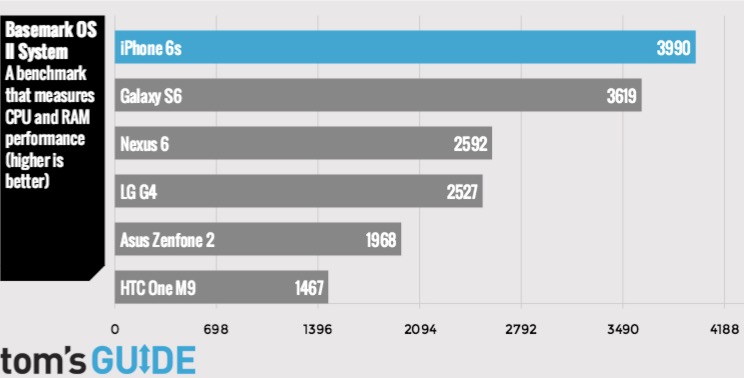
Basemark OS II Memory
Next up was the Basemark OS II memory test, which evaluates NAND storage performance by reading and writing files of varying sizes. This tells us the theoretical max speed at which the phone can save and retrieve data from storage, which affects things such as app load times and local media playback.
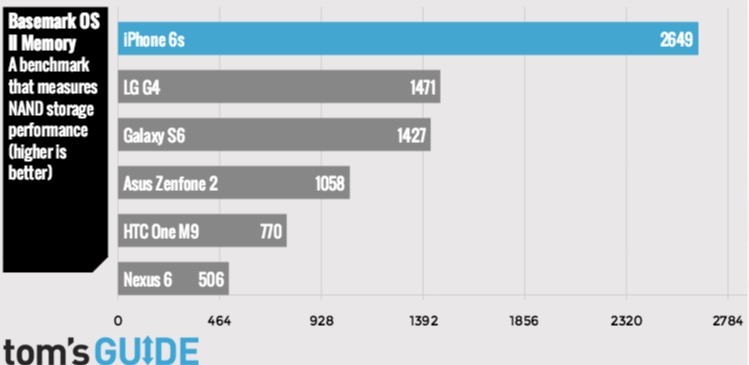
The iPhone 6s once again finished ahead of the rest of the pack. It was more than 45 percent faster than the next closest phone, the LG G4. The G4 barely edged out the S6, despite the Samsung's more advanced UFS system (Universal Flash Storage), which has the ability to perform simultaneous reading and writing and looks to replace the older eMMC standard used in other phones.
3DMark Ice Storm Unlimited
3DMark’s Ice Storm Unlimited is a gaming benchmark that does much of the work “off screen” and allows us to more accurately test processors and GPUs without worrying about how they power the screens themselves. The iPhone 6s’s A9 processor, again, showed just how fast it was by speeding past all the other phones for first place.
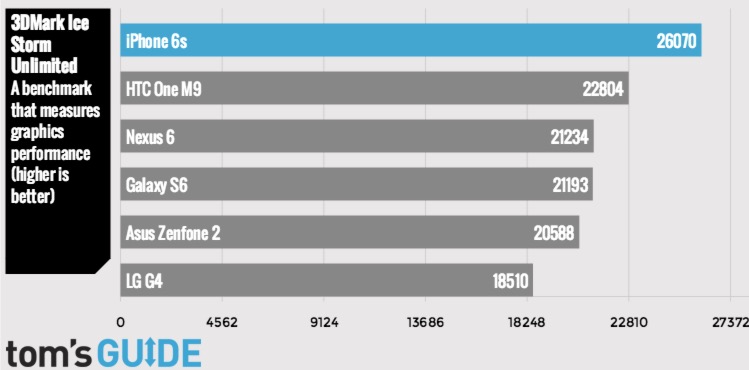
Wi-Fi Speed
Wi-Fi speeds are one aspect of performance that's often overlooked. A quick glance shows that every phone in our roundup features 802.11 ac capability, but our testing proves that not all Wi-Fi modems are created equal. Using the IxChariot networking benchmark, we sent packets of information to each phone from a blazing-fast Asus RT-AC87U router and measured the throughput.
From 15 feet away, the 6s delivered top speeds that were 30 percent faster than the next fastest phones, the S6 and HTC One M9. Those two, in turn, were more than 25 percent faster than the rest of the competition.. This can make a big difference in everyday use, whether you're downloading an app or movie, surfing the Web or streaming video.
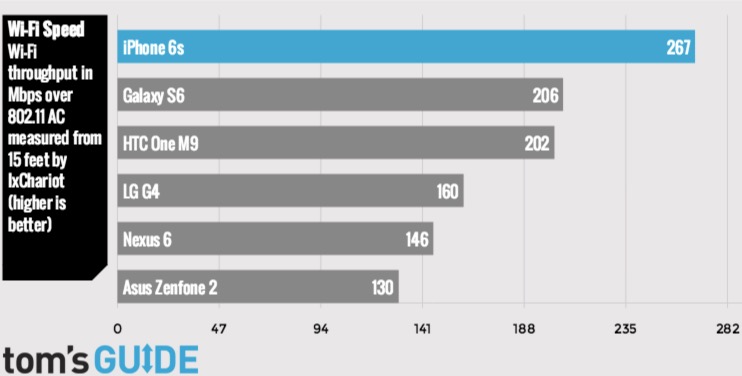
Bottom Line
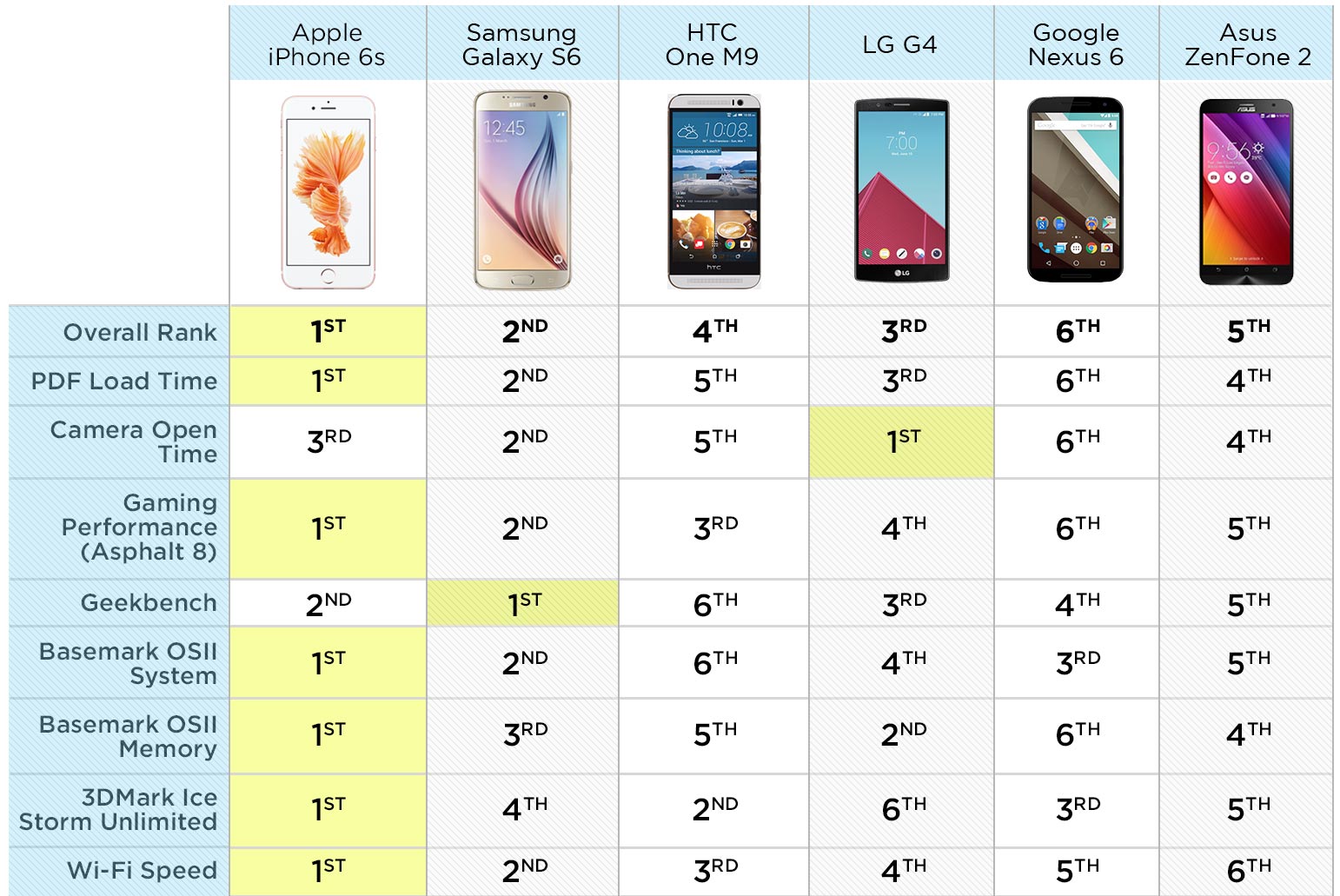
Apple’s A9 chip is the real deal. The iPhone 6s took six out of eight rounds, and it often won by an enormous margin. For now, the iPhone 6s is the fastest phone in the world. If you’re willing to live in Apple’s ecosystem, then you’ll enjoy an extraordinarily fast device.
Co-written by Alex Cranz
Sign up to get the BEST of Tom's Guide direct to your inbox.
Get instant access to breaking news, the hottest reviews, great deals and helpful tips.
Sam is a Senior Writer at Engadget and previously worked at Gizmodo as a Senior Reporter. Before that, he worked at Tom's Guide and Laptop Mag as a Staff Writer and Senior Product Review Analyst, overseeing benchmarks and testing for countless product reviews. He was also an archery instructor and a penguin trainer too (really).
-
MHolla Haha 52.5 ms for opening the camera and taking a picture :-) That's just a twentieth part of a second!!!Reply
All times are wrong by one decimal power!! -
Alfa man For Starters please fix the mistake in the overall table, the places for the zenfone 2 are wrong for the last 2 tests. Secondly, to get a performance in the middle of the pack in most tests for half the price for the asuAsus is something worth Mentioning in the closing article I think. Makes you rethink about your next smartphone....Reply -
You are comparing Samsung's 2015 phone, introduce recently, to Apple's 2014 iPhone 6... And not even the iPhone 6S (which is also last year's phone) that is faster than the 6.Reply
In a couple of months, Apple will be introducing its 2015 iPhones with the upcoming A9 processor, which will be substantially faster than the 2014 iPhones.
When that happens, comparing both Apple's and Samsung's 2015 phones, it will be a fair bet that the 2015 iPhones will be MUCH faster than Samsung's 2015 phone. -
rutherfordsc ReplyHaha 52.5 ms for opening the camera and taking a picture :-) That's just a twentieth part of a second!!!
All times are wrong by one decimal power!!
The time actually is 52.5 milliseconds. we slowed it down for the gif, so it's easier to see the differences. -
JacobJones11 Did you people seriously not heard of iMovie for iOS? Or one of the many 3rd party apps? Also: How is this real world performance, most of the tests were traditional artificial number-crunching or unrealistic 1GB+ PDF open performance. Do this: video the phones jumping between apps, scrolling, etc, the stuff you do daily, then measure dropped frames or input lag (the real deal breakers for perceived performance which is what matters as it's not dependent of having the phones side-by-side), then we'll talk. Also: we're talking about phones, not gaming rigs, maybe throw in some analysis on privacy, security and hardware degradation after a year of use.Reply -
rutherfordsc Reply16131288 said:Did you people seriously not heard of iMovie for iOS? Or one of the many 3rd party apps? Also: How is this real world performance, most of the tests were traditional artificial number-crunching or unrealistic 1GB+ PDF open performance. Do this: video the phones jumping between apps, scrolling, etc, the stuff you do daily, then measure dropped frames or input lag (the real deal breakers for perceived performance which is what matters as it's not dependent of having the phones side-by-side), then we'll talk. Also: we're talking about phones, not gaming rigs, maybe throw in some analysis on privacy, security and hardware degradation after a year of use.
The purpose of the article wasn't to determine the best security or the most reliable phone. You also realize that not a single phone has even been out for a year?
If you're an Apple fan, you should be pleased that despite what looks like a shortcoming in specs, still turned in a respectable performance, including solid PDF load times.
We did the piece because since there won't be any more phone announcements from now until the fall, it's a good time to do a mid-year review. I'm sure we'll revisit this again in the fall when more phones are released. -
ericburnby Kind of dis-appointed in Toms over this article. After reading your in-depth analysis over the years on processors and video cards I expected better.Reply
For example, why list only multi-core for Geekbench when the vast majority of software doesn't even utilize multiple cores? Or utilize them enough to keep all of them busy equally such that having those extra cores actually improves performance. At least include the single-core result as well. -
sock ReplyYou are comparing Samsung's 2015 phone, introduce recently, to Apple's 2014 iPhone 6... And not even the iPhone 6S (which is also last year's phone) that is faster than the 6.
In a couple of months, Apple will be introducing its 2015 iPhones with the upcoming A9 processor, which will be substantially faster than the 2014 iPhones.
When that happens, comparing both Apple's and Samsung's 2015 phones, it will be a fair bet that the 2015 iPhones will be MUCH faster than Samsung's 2015 phone.
Can you post the results of your benchmarks on the unreleased iPhone you mention vs. the Galaxy S6? Thanks. -
tkamps Why not benchmark the iPhone 6 Plus if you are doing benchmarks of the various companies' flagship phones?Reply -
Dmyke ReplyKind of dis-appointed in Toms over this article. After reading your in-depth analysis over the years on processors and video cards I expected better.
For example, why list only multi-core for Geekbench when the vast majority of software doesn't even utilize multiple cores? Or utilize them enough to keep all of them busy equally such that having those extra cores actually improves performance. At least include the single-core result as well.Kind of dis-appointed in Toms over this article. After reading your in-depth analysis over the years on processors and video cards I expected better.
For example, why list only multi-core for Geekbench when the vast majority of software doesn't even utilize multiple cores? Or utilize them enough to keep all of them busy equally such that having those extra cores actually improves performance. At least include the single-core result as well.
Actually, most apps use multi cores at the same time. At least on Android. Not really surprised by the winner. The One M9 though is a disgrace.
